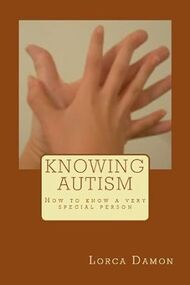What is the most concerning or destructive thing that is going on right now in your child’s world?
Damon, L. (2011) – We did alert the 911 office to Carries condition, mostly because she’s getting older and stronger. She may actually put up a huge fight.
< My Thoughts > “…older and stronger.”
The theme of this BLOG will be about how ‘parental concerns’ may changer, as their child becomes older and stronger.
13% …I certainly don’t waste a lot of time trying to make her become normal. …I do spend a lot of time trying to prepare her to live in the real world when she is older...
I want her to grow up to have a job that she enjoys, not some menial task in a sheltered workshop that wastes her really sharp mind.
I want her to be as independent as she can be, because it means the transition to the group home she will probably live in will be a lot less painful for both of us. I want her to be able to form relationships…
But she can’t do any of those things if I don’t make her adapt to a world that is very different from the one she would like to retreat to inside her head.
Potvin, J. E. (2013). We have had good luck with local colleges and universities. We hire students in the psychology, sociology or related fields. Many times, they have to do some sort of internship.
81% These students are young and have the energy to keep up with children with autism. They also give the child a break from routine. You help them by satisfying their graduation requirements. By paying them well, you ensure they do not take another job so you can get a break.
< My Thoughts > “…satisfying their graduation requirements.”
Speaking of “…satisfying their graduation requirements”… Our kids can also satisfy graduation/promotion requirements during an extended academic route.
According to the website, wrightslaw.com, children with an Individual Education Program (IEP) in place to help them reach their educational goals may receive public education until the age 21. Or, age 22 in some states.
So, our kids also have an opportunity to earn a promotion or graduation status through their Special Education IEP. In addition, every student becoming age 16 or older must have Transition Services as part of their Individual Education Program (IEP). This includes postsecondary goals related to training, education, and employment. Also, when appropriate – independent living plans.
Note: Along with accommodation, modifications, and placement issues, a child’s IEP should include a ‘Transition Plan’ (Sometimes the plan being implemented after the student graduates from elementary school; even earlier in some states).
Lee, A. (2023) says that – Transition plans prepare students for life after high school graduation. It should be in place by age 16. And, planning can include learning daily living skills, college preparatory classes, and career direction opportunities.
Cariello, C. (2015) – 17% Just as autism varies from person to person over time…as Jack gets older, his autism changes year by year.
Duan-Young (2014) 35% Aimee was older and much larger physically than Janey, but she was at a much lower level in her emotional and functional development. Janey treated Aimee like her little sister.
31% If you set your life up to make it easy to celebrate and be happy no matter what’s going on in your external world, not only will you be less stressed and happier you’ll make everybody around you feel better. Especially your kids.
And when your kids feel better, they’ll make more progress. My belief is that the fastest way to be happy is to turn expectation into appreciation. And the best part? Everybody is happy and feeling better while your kids are making progress.
34% Being smart is learning how to effectively and efficiently produce results. As a behavior analyst I look for cause and effect relationships. It’s my job to discover, like a detective, the direct cause (antecedents) of disruptive behaviors.
Almost every local or state government in the United States has a family agency to intervene on behalf of children. Many people don’t realize that there are thousands of families with children whose behavior is so disruptive that the desperate family contacts the local government office for help.
< My Thoughts > “…every local or state government in the United States has a family agency to intervene on behalf of children.”
Find out the lead agency for your State at the ECTA Center: http://ectacenter.org/contact/ptccoord.asp
States receive funds from the federal government to deliver human services that emphasize counseling, family preservation, family intervention, advocacy, and education. The Office of the Attorney General in your state offers parents, grandparents, and guardians help with a variety of issues; as well as a list of community service agencies to contact.
Duan-Young (2014) – 34% What happens with many disruptive children and teenagers is that the case workers from these government agencies have no choice but to detain these children in what amounts to a jail. There is no choice because some of the children are so aggressive they are a risk to themselves and their own family members.
The problem is that these children will only get worse, no better if they are put into a detention center. That’s why the Florida Office of Children and Families asked me to open a group home for some of these children. They knew that I could help the children better than a government agency.
< My Thoughts > “…group home…”
After years in a state owned ‘group home’ we were able to bring our Sonny home as a foster child. Only then did he respond to toilet training. He was 13 years old.
Cettina, T. (2017) – Although the diagnosis was crushing, one parent says it was also a huge help. “We came up with ways to make her life easier,” she says. “She's calmer now, as we know what she needs.” And the insurance company approved her therapy.
Many parents point to the lens that finally swayed them one way or the other: their child's self-esteem. “I understand when parents say they don't want to put a ‘ceiling’ on their child's potential by labeling them. But older kids tell me ‘I always knew I was different’.”
< My Thoughts > “…‘I always knew I was different’.”
One of the main reasons an older student of mine was ‘disqualified’ for services when he was younger, was because he was sometimes ‘friendly’, and ‘affectionate’. He had a lot of ‘age-appropriate’ language and conversation. The reason for that was probably because by the time they become adolescents, those with high-functioning autism see being friendly as a way to ‘manipulate’ their surroundings. No one has ever said that a child with autism couldn’t be manipulative and crafty! Besides, almost always, the language and lengthy conversations are always about the computer games they play. It’s called ‘perseverating on favorite topics.
Luker, S. (2014), For further information on the child who becomes older and stronger., please find the following on my website MENU -
UNIT 6 – WHERE TO LOOK FOR RESOURCES?
CHAPTER 1 – Networking & Support
CHAPTER 2 – Insurance & Intervention
CHAPTER 3 – Law – Federal, State, & Local
CHAPTER 4 – Future Challenges (Older Adult)
UNIT 6 – REFERENCES
UNIT 6 – APPENDICES – Nurse Tips for Dealing with Autistic Patients; Guardianship
Graham, M. A. (2024) – The 18th birthday of a child with special needs marks the beginning of significant changes regarding the benefits and services they can receive. In the United States, most children who turn 18 become adults in the eyes of the law, which means they are legally responsible for their choices and actions.
O’Diam & Estess Law Group (2023) tell us the Legal Considerations When A Child Turns 18. They consider the following legal documents as ‘absolutely crucial’ for parents to provide support and assistance to their children after age 18.
- A Durable General Power of Attorney is a financial document which allows someone to act on your behalf relating to any and all financial matters, including writing checks, paying bills, accessing bank account information, signing contracts, talking to credit card companies, and much more.
- A Health Care Power of Attorney is a legal document designating someone else to make medical decisions when you are no longer capable of making decisions for yourself. This document also should include a general HIPAA release, which provides your designated medical Agent the ability to receive protected medical information in an emergency.
- A Living Will Declaration provides instruction regarding artificial feeding and hydration in end of life situations.
- A FERPA Release allows an adult student to consent to the release of protected educational information to chosen individuals.
< My Thoughts > “…‘provide support and assistance…”
Support and assistance for the ‘disabled-adult-child” may be found by searching online. Some of the organizations to start with may be –
Federal Health Information Portability and Accountability Act or HIPAA. You may want to expunge your teen’s health records. Or, arrange a durable power of attorney, so you can be part of their health care provider decisions.
Also, under the 2010 U. s. Health-Reform Act, you may be able to continue your child’s coverage for health care. Medicaid can help with this, ask about a Medicaid Waiver.
Supplemental Security Income (SSI) is another federal government program from which families can receive assistance. Know that a minor child who didn’t qualify for services, may now qualify as an adult; or, adult-child with autism.
Othe of the nation’s many ‘disability resource’ organizations, may be found by searching ‘disability resource’ organizations online.
References:
Cariello, C. (2015). What Color is Monday? How Autism Changed One Family for the Better; eBook Edition.
Cettina, T. (2017). Special Needs Children: Should I Label My Kid?
Retrieved online from – http://www.parenting.com/article/special-needs-children/
Damon, L. (2012). Knowing Autism; eBook Edition.
Damon, L. (2011). Autism by Hand; eBook 2011 Edition.
Duan-Young, D. (2014). Autism: Why I Love Kids with Autism; eBook Edition.
Graham, M. A. (2024). Special Needs Alliance; Retrieved online from –
https://www.specialneedsalliance.org/
Lee, A. (2023). What Is IEP Transition Planning; Retrieved online from –
https://www.understood.org/en/articles/iep-transition-planning-preparing-for-young-adulthood
Luker, S. (2024). Know Autism, Know Your Child with < My Thoughts > by Sara Luker; Retrieved online from – www.sarasautismsite.com
O’Diam & Estess Law Group (2023). Happy Birthday To You: Legal Considerations When A Child Turns 18; Retrieved online from –
https://oedayton.com › 2023/02/16 › happy-birthday-to-you...
Potvin, J. E. (2013). Autism Triplet Twist: Survival Stories of Parents, Triplets and Autism; eBook Edition.
End of DAY EIGHTEEN.
Note: Excerpts from the books – (13% indicates location in the Kindle version of the eBook, instead of page numbers).
Sharing of my website and BLOG Comments welcomed. Thank-you to those of you who have sent comments... much appreciated!
Regards,
Sara Luker


 RSS Feed
RSS Feed